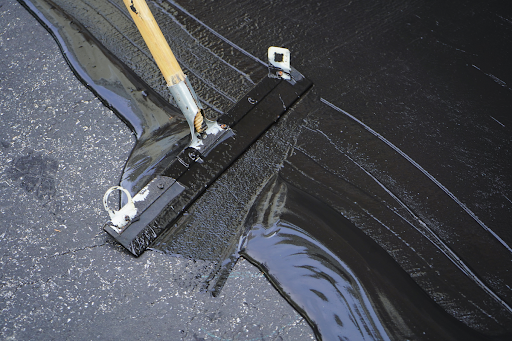- Unmasking Alligator Cracking: The Hidden Enemy of Asphalt Pavement
- Are Asphalt and Sealcoating Environmentally Friendly?
- Should I Repair My Potholes in Spring?
- 5 Important Questions You Should Ask Your Seal Coating Company
- How Does Snow Cause Potholes on Asphalt Roads?
- How Can Driveway Paving Add Value to Your Home?
- How Does Sealcoating Protect Driveways From Damage?
What’s the Difference Between Asphalt Paving & Sealcoating?

As beautiful as your new asphalt pavement starts out, your paved asphalt driveway will eventually deteriorate and lose a bit of its shine. That’s where asphalt sealcoating can help. Sealcoating helps protect the condition of your existing pavement. Although they are sometimes confused, sealcoating and asphalt paving are two different pavement processes. While they have differences in what they are and the factors that make them necessary, they also work in tandem to perfect the look and longevity of the pavement.
What Is Asphalt Paving?
Asphalt paving is the process of constructing or replacing an asphalt surface and is usually recommended to repair surfaces with cracks and potholes or used to create driveways and parking lots. Odds are, if you’ve driven on a road with exposed maintenance holes and an uneven surface, you are understanding the need for asphalt paving.
What Is Sealcoating?
Sealcoating is a process in which a coating is applied to asphalt pavement to “seal” it from damage. During this process, your asphalt professionals will lay a liquid that acts as a thin layer to protect from harsh elements. Sealcoating mostly helps prevent the sun’s radiation and UV rays from wearing out the asphalt and protects against other elements like cars, fuel penetration, and natural wear and tear.
How Do They Differ?
These products differ as they are processes separate from each other and meant for different purposes throughout asphalt’s lifespan. Asphalt paving creates and repairs asphalt surfaces, while sealcoating prevents and delays the repair process. Asphalt paving is a much more time-consuming process, while sealcoating is similar to a cosmetic improvement to the pavement and a form of preventative maintenance.
When Should I Pave My Asphalt?
If you’re thinking about getting a new asphalt driveway or if you notice that your driveway or commercial property parking lot is damaged and at the end of its lifespan, an asphalt overlay is your best bet. Some common indicators of worn pavement include pools of water in deep holes and large cracks, as well as signs of crumbling and deterioration. Your typical asphalt driveway will last about 15-20 years. Asphalt paving gives you a new smooth surface, but don’t forget that you have to protect your new pavement and get the most bang for your buck. Reminder: A newly paved asphalt driveway or other asphalt surfaces will take about 30 days to cure fully, but you can typically start driving on it after three days. Within these 30 days, you want to be careful not to turn your steering wheel when driving your car and avoid large and heavy items dropping onto your driveway to prevent scuff marks.
When Should I Get Sealcoating?
You want to get a sealcoating before your driveway starts to face the effects of damages and deterioration. Sealcoating is recommended for 1-year-old driveways and is an efficient, cost-effective way to improve your driveway’s lifespan. They last about 3-5 years if you get a precision sealcoating from a reputable contractor.
Superior Seal Coating Is an Asphalt Paving and Sealcoating Company in One!
Sealcoating and asphalt paving should be done by a trusted contractor. Superior Seal Coating is here for residents of the Southeastern PA in search of asphalt paving and repair services. Reach out to us today if your pavement needs servicing, and we’ll send out our experts to your home.